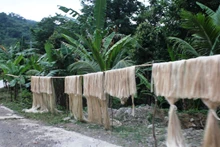
In the quest for optimal health and nutrition, we often find ourselves drawn to the wonders of nature, seeking nourishment that not only sustains but also revitalizes our bodies and minds. Among the array of plants that have captured the attention of health enthusiasts worldwide, one stands out prominently for its remarkable nutritional profile and diverse benefits - moringa oleifera, fondly dubbed as the "miracle tree" or simply moringa.
Native to the sub-Himalayan regions of India, Pakistan, Bangladesh, and Afghanistan, moringa has been revered for centuries in traditional medicine and culinary practices. Today, its global recognition as a superfood continues to soar, captivating the attention of health-conscious individuals and researchers alike.
Nutritional Powerhouse
At the heart of moringa's acclaim lies its unparalleled nutritional density. Packed with essential vitamins, minerals, antioxidants, and amino acids, every part of the moringa tree - from its leaves, seeds, and pods to its roots and bark, offers a wealth of health-enhancing properties.
Moringa leaves, in particular, stand out as a nutritional powerhouse, boasting high levels of vitamin C, vitamin A, calcium, potassium, iron, and protein. In fact, gram for gram, moringa leaves contain more vitamin C than oranges, more calcium than milk, and more iron than spinach, making it an invaluable addition to diets deficient in these vital nutrients.
Health Benefits
Moringa, known as a powerhouse of nutrients and bioactive compounds, offers a plethora of health benefits that make it a valuable addition to any diet. First and foremost, its potent antioxidants play a crucial role in bolstering the immune system, shielding the body from oxidative stress and inflammation, thus fortifying its defenses against illnesses.
Moreover, moringa serves as a natural multivitamin, providing essential nutrients vital for overall health and vitality, particularly in regions where nutritional deficiencies prevail. Its ability to regulate blood sugar levels showcases its potential as a dietary supplement for individuals managing diabetes or predisposed to the condition, as suggested by various studies.
Sustainable Solution
Beyond its nutritional prowess, moringa emerges as a sustainable solution to various socio-economic and environmental challenges. Thriving in arid and semi-arid climates, moringa is remarkably resilient to drought and poor soil conditions, making it an ideal crop for regions grappling with food insecurity and climate change.
Moringa's fast-growing nature and ability to thrive in diverse ecosystems make it a valuable tool in reforestation efforts and soil restoration projects. By harnessing the power of moringa, communities can cultivate sustainable livelihoods while safeguarding the planet's precious resources.











